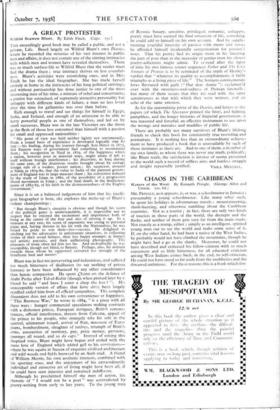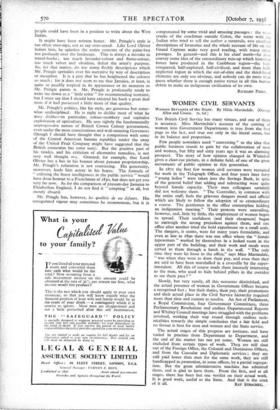CHAOS IN THE CARIBBEAN
MR. PRINGLE, as it appears, is, or was, a schoolmaster in Jamaica ; presumably a young schoolmaster. Like many other such, he spent his holidays in adventurous travels ; mountaineering, shark-hunting, and otherwise rambling about the Caribbean countries. Not as a tourist ; in fact, there are only two kinds of tourists in those parts of the world, the decrepit and the flashy, and neither of them gets very far from the main roads. Not exactly as a tramp, either ; simply as an intelligent, spirited young man out to see the world and make some sense of it. If, on the other hand, he had been a native of the West Indies, he probably would not have climbed the mountains, though he might have had a go at the sharks. Moreover, he could not have described and criticised his fellow-citizens with so much enjoyment and so little bitterness, for all educated criticism among West Indians comes back, in the end, to self-criticism. He could not have stood so far aside from the snobberies and the thwarted ambitions. For these reasons this is a book which few
people could have been in a position to write about the West Indies.
It might have been written better. Mr. Pringle's style is too often over-ripe, not to say over-sexed. Like Lord Olivier before him, he splashes the entire contents of the paint-box too profusely over the landscape. This is always a mistake in travel-books ; too much lavender-colour and flame-colour, too much velvet and obsidian, defeat the artist's purpose. So, for that matter, do too many fleshly descriptions which Mr. Pringle sprinkles over his narrative by way of description or metaphor. It is a pity that he has heightened the colours so much ; for it does not seem to me that Jamaica, at least, is quite so gaudily tropical in its appearance or its manners as Mr. Pringle paints it. Mr. Pringle is professedly ready to write me down as a " little critic " for recommending restraint, but I must say that I should have enjoyed his book a great deal more if it had possessed a little more of that quality.
Mr. Pringle's politics, like his style, are generous but some- what undisciplined. He is right to dislike most of what he does dislike—in particular, colour-snobbery and capitalist exploitation of agriculture. He sees rightly the fundamentally unprogressive nature of British Crown Colony government, even under the most conscientious and well-meaning Governors (though I should have thought that a comparison with some of the Central American banana republics under the sway of the United Fruit Company might have suggested that the British connexion has some uses). But the positive part of his tirades, and his criticism of alternative remedies, is not very well thought out. Granted, for example, that Lord Olivier has a bee in his bonnet about peasant proprietorship, Mr. Pringle's refutation is not convincing. His generosity, moreover, leads him astray in his hopes. The formula of " enlisting the finest intelligences in the public service "would have done honour to a Frenchman of 183o, but does not get you very far now. As for the comparison of present-day Jamaica to Elizabethan England, I do not find it " tempting " at all, but merely absurd.
Mr. Pringle has, however, les qualites de ses delauts. His unregulated vigour may sometimes be monotonous, but it is
compensated by some vivid and amusing passages : the wise- cracks of the coachman outside Colon, the scene with the Indian who tried to sell the author a tarantula, two excellent descriptions of lavatories and the whole account of life on the Grand Cayman make very good reading, with many other passages. In general—and this is his chief merit--he does convey some idea of the extraordinary mix-up which historical forces have produced in the Caribbean region—the half- conquered, half-exploited, half-civilised, and more than half- neglected region in which the out-of-date and the third-hand elements are only too obvious, and nobody can do more than guess whether there is enough native virtue in all this human debris to make an indigenous civilisation of its own.
RICHARD PARES.















































 Previous page
Previous page